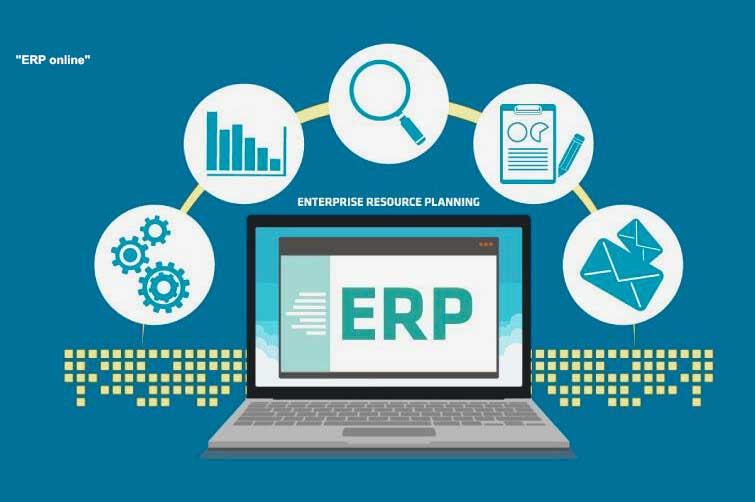Unlocking Accessibility: The Dynamics of Online ERP Solutions
In the ever-evolving landscape of business technology, Online Enterprise Resource Planning (ERP) has emerged as a game-changer, redefining how businesses manage their operations. As businesses increasingly operate in a digital ecosystem, the shift towards online ERP solutions signifies a crucial step in enhancing accessibility, collaboration, and efficiency. In this article, we delve into the realm of Online ERP, exploring its key attributes, benefits, and the transformative impact it brings to businesses operating in the digital age.

Unveiling Online ERP
1. Cloud-Based Accessibility: Online ERP, also known as Cloud ERP, is characterized by its cloud-based architecture. Unlike traditional ERP systems that may be on-premises, online ERP solutions leverage the cloud, providing users with the flexibility to access the system from any location with an internet connection. This cloud-based accessibility is a cornerstone of the transformative power of online ERP.
2. Real-Time Collaboration: One of the defining features of online ERP is real-time collaboration. With data stored in the cloud, teams can collaborate seamlessly, whether they are in the same office or working remotely. This real-time collaboration enhances communication, fosters teamwork, and accelerates decision-making processes.
3. Automatic Updates and Maintenance: Online ERP eliminates the need for manual updates and maintenance. The cloud-based nature of the system ensures that updates are automatically deployed, including new features, security patches, and improvements. This alleviates the burden on internal IT teams and ensures that businesses always operate with the latest software version.
Key Functionalities of Online ERP
4. Scalability: Online ERP solutions are inherently scalable. As businesses grow or experience fluctuations in demand, the cloud-based infrastructure allows for seamless scalability. Companies can easily add new users, modules, or features to match their evolving needs without the need for significant infrastructure investments.
5. Data Security: Data security is a top priority for any business, and online ERP solutions prioritize robust security measures. Cloud service providers implement advanced security protocols, encryption, and regular audits to ensure that sensitive business data remains protected from unauthorized access or cyber threats.
6. Accessibility Across Devices: The online nature of ERP extends accessibility across various devices. Whether users are on desktop computers, laptops, tablets, or smartphones, they can access the ERP system with a consistent user experience. This accessibility enhances flexibility and productivity for a workforce that increasingly values mobility.
Advantages of Online ERP
7. Cost-Efficiency: Online ERP solutions often operate on a subscription-based model, eliminating the need for significant upfront capital investments. This cost-efficient model allows businesses to pay for the services they use, making it particularly appealing for small and medium-sized enterprises.
8. Disaster Recovery and Business Continuity: The cloud infrastructure of online ERP provides built-in disaster recovery capabilities. In the event of data loss or system failures, businesses can recover quickly, ensuring minimal disruption to operations and maintaining business continuity.
9. Improved Business Insights: Online ERP solutions leverage advanced analytics and reporting tools. This results in improved business insights, as users can generate real-time reports, analyze key performance indicators, and make data-driven decisions to drive business success.
Considerations When Implementing Online ERP
10. Internet Reliability: The effectiveness of online ERP relies on a reliable internet connection. Businesses considering the adoption of online ERP should assess their internet infrastructure to ensure consistent and high-speed connectivity.
11. Vendor Reputation: Selecting a reputable online ERP vendor is crucial. The track record, customer reviews, and support services provided by the vendor play a significant role in the successful implementation and ongoing usage of the ERP system.
12. Data Migration and Integration: For businesses transitioning from on-premises ERP or other systems, careful consideration of data migration and integration is essential. Online ERP implementation should include a well-planned strategy to ensure a smooth transition and data consistency.
The Future of Online ERP
As technology continues to advance, the future of online ERP holds exciting possibilities. Trends such as artificial intelligence, machine learning, and enhanced automation are likely to be integrated into online ERP solutions, further enhancing their capabilities and providing businesses with even more intelligent and responsive tools.
In Conclusion: Redefining Business Operations
In conclusion, Online ERP stands as a transformative force in the world of business technology. Its cloud-based accessibility, real-time collaboration, and scalability make it a strategic choice for businesses seeking agility and efficiency in the digital age. As the business landscape continues to evolve, the adoption of online ERP becomes not just a technological upgrade but a strategic imperative for those aiming to redefine their operations, drive innovation, and thrive in an increasingly connected and dynamic business environment.